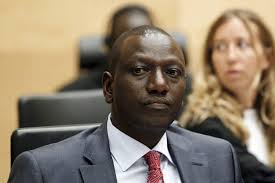Why William Ruto must go to The Hague for his own trial – Eugí¨ne Bakama Bope

 With the trial slated to start in mere weeks, those following Kenya’s Deputy President William Ruto’s case before the International Criminal Court anxiously await a crucial decision from the Appeals Chamber concerning his continuous presence at trial. On June 18, 2013, Trial Chamber V (a) deviated from necessary legal standards by granting Ruto conditional excusal from continuous presence at his trial in The Hague so that he can attend to duties of state – a decision that “authorizes Mr Ruto’s absence for substantially all of his trial.” On August 20th, the Appeals Chamber suspended Ruto’s excusal until the panel of judges issues their final decision on the matter, thus ordering his presence at trial commencing on September 10th.
With the trial slated to start in mere weeks, those following Kenya’s Deputy President William Ruto’s case before the International Criminal Court anxiously await a crucial decision from the Appeals Chamber concerning his continuous presence at trial. On June 18, 2013, Trial Chamber V (a) deviated from necessary legal standards by granting Ruto conditional excusal from continuous presence at his trial in The Hague so that he can attend to duties of state – a decision that “authorizes Mr Ruto’s absence for substantially all of his trial.” On August 20th, the Appeals Chamber suspended Ruto’s excusal until the panel of judges issues their final decision on the matter, thus ordering his presence at trial commencing on September 10th.
The Trial Chamber’s decision to excuse Ruto from trial violates both the original meaning and underlying intent of the Rome Statute, and also runs counter to the principles of justice for both victims and the accused. Because of this, and in the interest of justice, the Appeals Chamber should overturn the Trial Chamber’s decision and Ruto should be obligated to appear for the entirety of his trial to face the court and the evidence presented against him.
Excusing Ruto from trial at the ICC expressly violates several notable provisions of the Rome Statute, and contradicts the Statute’s historical context.
Article 63(1) of the Rome Statute clearly articulates, “the accused shall be present during the trial,” indicating a positive obligation of physical presence at trial proceedings, not an option to be considered or merely waived. It is well settled that the word shall within the legal context implies both duty and requirement, further bolstering the clarity of Article 63(1) and the explicit “language of command” as to the accused’s presence at trial. The Rome Statute’s historical record indicates that the drafters outright excluded all proposed exceptions to the accused’s presence at trial, including the notion of trials in abstentia. The only two scenarios the drafters of the Rome Statute opted to allow for the accused to deviate from obligatory presence before the Court is, 1) when the accused is considerably disruptive, or 2) an accused opts to waive their right to be present during the pretrial proceedings.
Article 27 demands that the Rome Statute be applied “equally to all persons without any distinction based on official capacity.” As such, it is erroneous to excuse Ruto because of his newly assumed position. While the important role of Kenya’s Deputy President is not in dispute, the Rome Statute and the ICC were established precisely to combat impunity and render justice to those in positions of authority.
Ruto’s excusal also jeopardizes the interests of the victims of Kenya’s 2007-08 post-election violence, who have been waiting for more than five years for meaningful justice. Most victims – and a majority of Kenyans for that matter – still view the ICC as the most appropriate venue to prosecute those responsible for post-election violence crimes. To rob victims of the opportunity to witness the accused on trial could have a detrimental effect on the victims’ trust in the truth seeking process and the ability of the court to ultimately hold the accused accountable.
Looking beyond the ICC’s legal framework, the fundamental right and obligation of an accused person to attend trial is enshrined in Article 14 of the International Covenant on Civil and Political Rights, alongside a variety of other crucial provisions dealing with due process and fair trial rights. Countless national legal frameworks – Kenya’s included – domesticate these underlying principles from the ICCPR. Article 50 of Kenya’s constitution notes that an accused has the right “to be present when being tried.” It is worth noting that there are very limited circumstances for which some jurisdictions allow the accused to not be present at trial, namely: when there exists an unencumbered right to retrial; when a defendant abuses their right to be present through consistent disruptive behavior and is removed from the courtroom in order to ensure the trial is expeditiously fair; or, in very limited occasions when the accused unequivocally and voluntarily waives their right to be present, which is often only permitted at the ad hoc international tribunals when restricted by limiting circumstances and for fixed time frames.
International criminal law expert, Mahmoud Cherif Bassiouni reflected on the interrelated complexities of presence at trial with other fair trial rights, noting that an accused’s presence at trial embodies “an important element of the right to defend oneself against criminal charges…[and relates to] the assumption that the ability of the accused to face… judge[s] and accusers adds a dimension of credibility to the proceedings and enhances the ascertainment of the truth.” Similar to the ICC, most international and national jurisdictions reject trials in abstentia because they are inherently unfair due to the impossibility of effective participation by the defendant in both their trial and the delivery of an adequate defense.
Therefore, to ensure fair trials and to uphold the principles of justice, it is imperative that those accused of both ordinary and international crimes are present at trial. Deputy President William Ruto should not be an exception to this rule.
Eugí¨ne Bakama Bope is the President of Club des Amis du droit du Congo (Congolese Friends of the Law Club) & an Adviser to Case Matrix Network.






This will surely not happen now as the Kenyan parliament has just voted to withdraw from the ICC itself. So, what was the point of joining it in the first place? Is the Kenyan government serious or not about bringing to justice those charged with being complicit in the terrible massacres following the 2009 election? Apparently not, sadly.
Jimmy Grisewood
Well he turned up didn’t he? And over the coming weeks and months he will expose the conspiracy to frame him that has been documented at my website gileshumphry.com/politics. James Grisewood follows African arguments policy of repeating the charges and implying guilt while refusing even to consider the copious evidence of witness coaching and unethical practices on the part of the prosecutor. That’s for the court alone to judge we are to believe, though the sub judice rule apparently allows you to parrot the prosecution ad nauseam. Expect to be embarrassed!